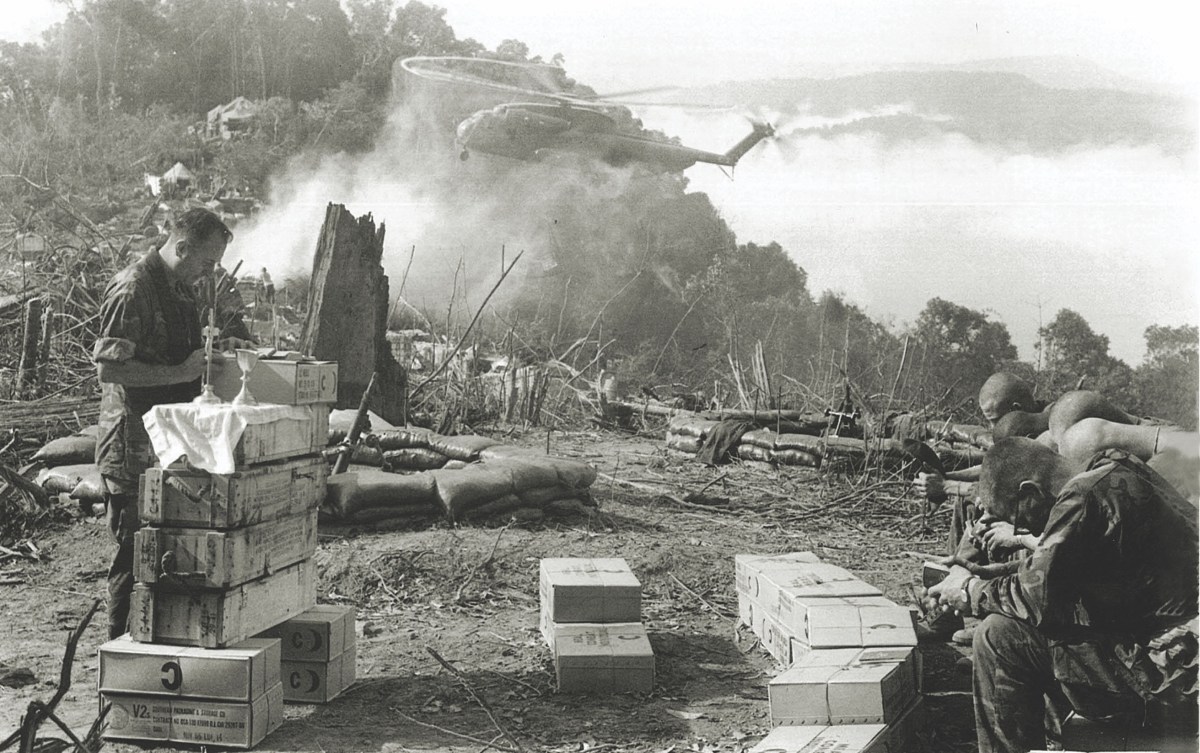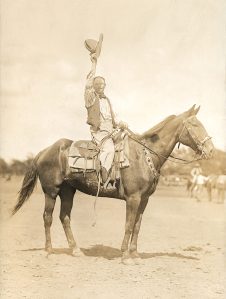A company of the 3rd Marine Division was patrolling in South Vietnam’s A Shau Valley on Feb. 22, 1969, when it was ambushed. A mortar round struck the command group, seriously wounding the platoon leader and others. A young first lieutenant, Lee Roy Herron, found himself in charge.
Pfc. Terry Presgrove, hurt in the mortar blast, explained what happened next. “Lee came up to me shortly after the mortar had hit in our midst. I was lying on my back on top of another wounded Marine.” Screaming above the roar of the firefight, “Lee knelt down and asked me where my battle dressing was, seeing that I was bleeding.”
The two men exchanged a few words. Then, Presgrove recounted, Herron “used the only four-letter word I ever heard him say: ‘Damn.’ He was visibly upset by the carnage but had that look of determination and firm resolve to do his duty. Our eyes met, communicating without speaking the knowledge that we were in a serious jam. He patted me on the head and quickly moved off toward the dug-in enemy.”
I met Herron in seventh grade at Matthews Junior High School in Lubbock, Texas, in 1957. We soon became best friends. By fall 1962, we knew we would have to register for the draft. The U.S.-backed April 1961 invasion of Fidel Castro’s Cuba by Cuban exiles had turned into the Bay of Pigs disaster, and the October 1962 Cuban Missile Crisis raised fears of a nuclear war with the Soviet Union.
Herron and I began college life in 1963 at Texas Tech University in Lubbock. He was a government major. I took pre-law courses. Herron went into a Marine officer program, the Platoon Leaders Class, in 1964. On his advice I joined him in the Marines on Oct. 21, 1965.
On June 13, 1966, Herron and I flew to Washington, D.C., on our way to nearby Marine Corps Base Quantico, where officer training is conducted. Gung-ho, Herron finished first in his class. I was satisfied with just completing the tough training course and graduating.
I was accepted into a Marine Corps law program and preferred to do my military service as a member of the Judge Advocate General’s Corps, a JAG officer. Herron was determined to be an infantry officer. We parted ways. Newly married, I began law school at Southern Methodist University. He headed for Vietnam.

Herron left Quantico for Monterey, California, and the Defense Language Institute. He called from there with exciting news: “Guess what, David? Danelle Davis and I are getting married. You remember her, don’t you? Can you come to our wedding May 4 in Lubbock?” I had to tell him I could not. I would be in the middle of law school final exams. Missing Herron’s wedding remains one of my deepest regrets.
Herron excelled at the language school and was offered the opportunity to serve in Washington, D.C., as a Vietnamese language translator. Of course, he refused that opportunity so he could go to Vietnam. He arrived there Dec. 30, 1968. Herron was a first lieutenant assigned to Headquarters and Service Company, 3rd Marine Division, at the Vandegrift Combat Base in northern South Vietnam. He asked for transfer to the front lines and was sent to Alpha Company, 1st Battalion, 9th Marine Regiment, 3rd Marine Division.
Even in Vietnam, Herron maintained his strong faith in God’s purpose and destiny for him. His sister Jane sent me a photograph that showed him attending a church service at a base other than the one to which he was assigned. Herron had hitched a ride with a resupply helicopter just to attend the service.
The chaplain in the photograph, retired Navy Capt. Salvatore Rubino, eloquently described the service. “There was the utter desolation and destruction all around,” he said. “There was the noise. Often, even during the worship services fire power was called in and guns would roar. …Just before I served communion, a helicopter approached to deliver ammunition. The wind generated by the rotor was so strong that I had to cover the chalice with my hands to keep it from flying away. I was even afraid that the altar, made up of five C-ration boxes and four ammo boxes, would bite the dust.”
Herron described his combat experience in a Feb. 18, 1969, letter to Charles Lance, a close friend of ours in high school and college: “I’m ‘used to’ fire fights by now. It’s amazing how one adapts to this ‘madness’ – the blood, etc. doesn’t bother me at all. Generally speaking, we’re kicking hell out of NVA. Regiment has broken their code, and we know that they are really hurting. Between a regiment of Marines, AIR, and arty – they can either fight and die or retreat. So far they have been fighting. Our body count keeps mounting.”
During the Feb. 22, 1969, battle when Alpha Company was ambushed, Herron saved the lives of numerous Marines before being killed. He was awarded the Navy Cross, the second-highest valor award for Marines.
The company commander, 1st Lt. Wesley Fox, who received the Medal of Honor for his own actions that day, described Herron’s death to Danelle in a March 12, 1969, letter: “I am sorry that this is so late. The reason is Alpha company is still in the bush and operating on the Laotian border close to where Lee died. On 22 February our company was on patrol and moved into the attack on a known North Vietnamese position. They were in bunkers and had a good machine gun defense. My command group was hit by a mortar round which also wounded the 2nd Platoon leader.
“Lee took command of the 2nd Rifle Platoon and led them in the attack on the machine gun positions. His last words to his radio operator were ‘I am going to get that gun’ and with that he jumped up firing and throwing hand grenades until he did knock out the gun position.” A supporting enemy machine gun hit Herron high in the chest and he died instantly.
“Lee loved you very much,” Fox continued, “as he spoke of you often and always had your picture handy.
He loved God and his country and for these three things he died. He died a Marine hero and he has been put in for our country’s highest medal, the Medal of Honor. I know this will not ease your loss in the least but you can expect to be called on to receive this for Lee.”
I heard Fox speak about the battle on Aug. 2, 1997, when he was a retired colonel addressing the Texas Association of Former Marines. He said there was a heavy mist and cloud cover when Herron ran toward a machine gun bunker to destroy it, but after he succeeded and went after the final bunker, the mist and cloud cover suddenly lifted. In the sunlight, Herron was clearly visible to the enemy in the bunker and was killed by machine gun fire. Fox, taking advantage of the clear skies, called in air support to destroy that last bunker.
Herron’s mother, Lorea, expressed no bitterness. “He died doing what he always wanted to do—defend his country,” she hold me. He had prepared her for that eventuality in a “just in case” letter written to his parents in November 1968, the month before he shipped out to Vietnam. He left the letter with Lance in Lubbock.
“When you read this I’ll be dead or missing in action,” Herron began. “This letter is my way of saying goodbye and is a final thank you for being such wonderful parents. …Please believe me when I say that I have no regrets. I was given the best parents that a child could have. I was taught to love God and our country, and since it was God’s will that I die young, I’m proud to die as a Marine defending America.” V
David Nelson spent three years on active duty and achieved the rank of captain. After his service, he was a tax partner with Ernst & Young and later vice president of Houston Endowment, a private foundation. He lives in Houston.
This article appeared in the April 2021 issue of Vietnam magazine. For more stories from Vietnam magazine, subscribe here and visit us on Facebook:






